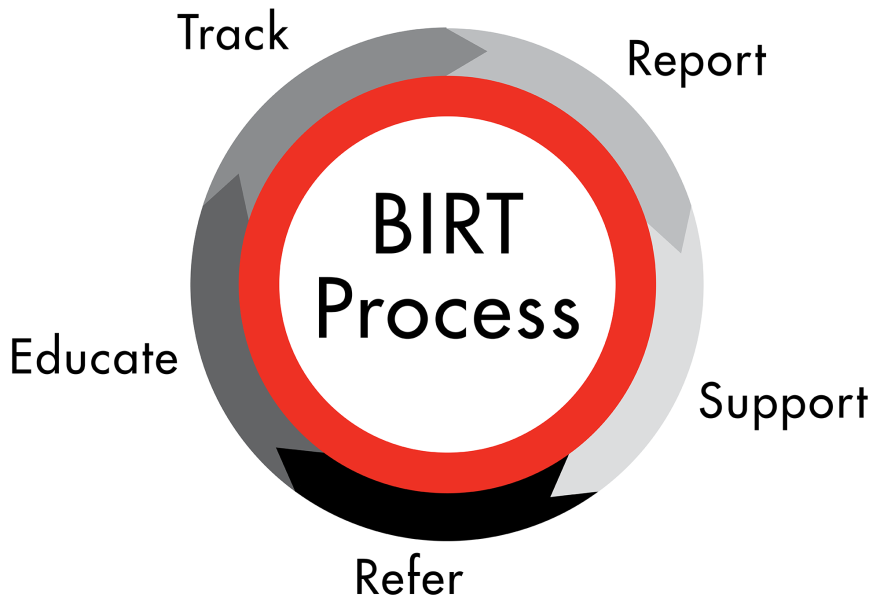What is a bias incident?
A bias incident is an act of prejudice against an individual or groups based on their actual or perceived race, color, ethnicity, national origin, age, sex, gender, sexual orientation, gender identity or expression, marital status, veteran status, pregnancy, childbirth, religion, disability, creed or any other protected class.
Examples may include the following, if there is evidence that the target or victim was chosen because of a characteristic such as those listed above:
- vandalism to personal or college property
- intimidating comments, messages, or behaviors
- defacement of posters or signs
- disparate treatment
It is important to note that just because the expression of an idea or point of view may be offensive or inflammatory to some, may not necessarily be a bias-related incident. Furthermore, political affiliation is not a protected class. If you experience harassment or threats based on political affiliation, please submit your concerns to the Dean of Students, Human Resources, or Academic Affairs.
What is a hate crime?
Note: All hate crimes are bias incidents, but not all bias incidents are hate crimes. Even if a bias incident is not a crime, we can and will respond to address hurtful behavior.
A hate crime is a criminal offense that manifests evidence that the victim was intentionally selected because of the perpetrator’s bias against the victim. Read more on the Iowa Hate Crime Law (PDF).
Discrimination and Harassment
The College encourages a workplace and learning environment free of discrimination, harassment, and/or inappropriate treatment and does not condone or tolerate any inappropriate conduct of any employee, student, or guest because of any person's race, color, ethnicity, national origin, age, sex, gender, sexual orientation, gender identity or expression, marital status, veteran status, pregnancy, childbirth, religion, disability, creed or any other protected class protected under federal, state or local law. To be unlawful, conduct must be sufficiently serious that it unreasonably interferes with an employee's ability to work or a student's ability to learn or benefit from the College's programming.
The College also recognizes the fundamental importance of the open and free exchange of ideas and opinions. It recognizes that conflicts may arise between individuals' desires to express their opinions and the right of individuals to be free from harassment. The College also recognizes that every act that might be offensive to an individual or a group is not necessarily a violation of the law or of this policy.
You can read more about the College's Nondiscrimination Policy (including sexual and gender-based harassment) and Grievance Procedures. Additional information can be found in the Student Handbook, Faculty Handbook, and Staff Handbook (login required).
Note: Not all bias incidents constitute discrimination or harassment under these policies. However, even if a bias incident does not constitute harassment, we can and will respond to address hurtful behavior and to support the targeted individual or group.
Have you experienced bias?
Have you experienced an incident of bias? We want to know about it. Specific offices and administrators are here to support you. Responses to this form are kept confidential.
Bias Incident Response Team Process
As outlined on these pages about the Bias Incident Response Team, the BIRT team exists to support individuals or groups reporting under this policy. The purpose of the process is to provide support to the target individuals or groups after an incident occurs.
Report
Any Grinnell College student, staff, or faculty who has knowledge of, or has experienced a bias incident, on or off campus, may report an incident. BIRT members will work with the appropriate College officials and other individuals, groups, or organizations as appropriate. Incidents that may be considered criminal will be investigated by the City of Grinnell Police Department or other appropriate law enforcement agencies.
Support
The BIRT’s focus is to support the Grinnell community by meeting with and ensuring the affected individual(s) and others have access to appropriate resources.
Refer
The BIRT will assign college officials to work with individual students, staff, faculty, and communities affected by a bias offense to assess and initiate an appropriate response.
Educate
The BIRT will collaborate with the Office of Diversity, Equity, and Inclusion to educate the campus community on issues related to diversity and inclusion. Cases that require restorative or corrective measures, and/or disciplinary action, will be forwarded appropriately.
Track
The BIRT maintains a log of all bias incidents, which will be viewed on the BIRT website. The BIRT will track and assess the impact bias incidents may have had on the Grinnell College community and make recommendations to prevent future incidents on campus. A report will be published annually.
Bias Incident Response Team
What does BIRT do?
We assist the individual/group who reported the bias incident. Our primary focus is to support the Grinnell College community member who reported the bias incident. We do this by meeting with (if the persons choose to) and ensuring the affected individual(s) and others have access to appropriate support and resources. As required by law and College Policy there are situations where the BIRT team will also refer the report to another office to address through their policies and processes.
Reports of possible criminal conduct will be referred to Grinnell College Campus Safety. Potential Title IX violations will be referred to the Title IX Coordinator. Conduct with could violate the Student Handbook will be referred to the Dean of Students. Possible violations of the Employee Handbook will be referred to the Office of Human Resources. Potential violations of the Academic Handbook will be referred to Academic Affairs.
We work with the appropriate College officials and other individuals, groups, or organizations. Through this collaboration, we can determine if the reported act meets the definition of a “bias incident.”
How are bias incidents tracked? Incidents will be logged, and reviews of the log and annual statistics inform future actions and programming.

